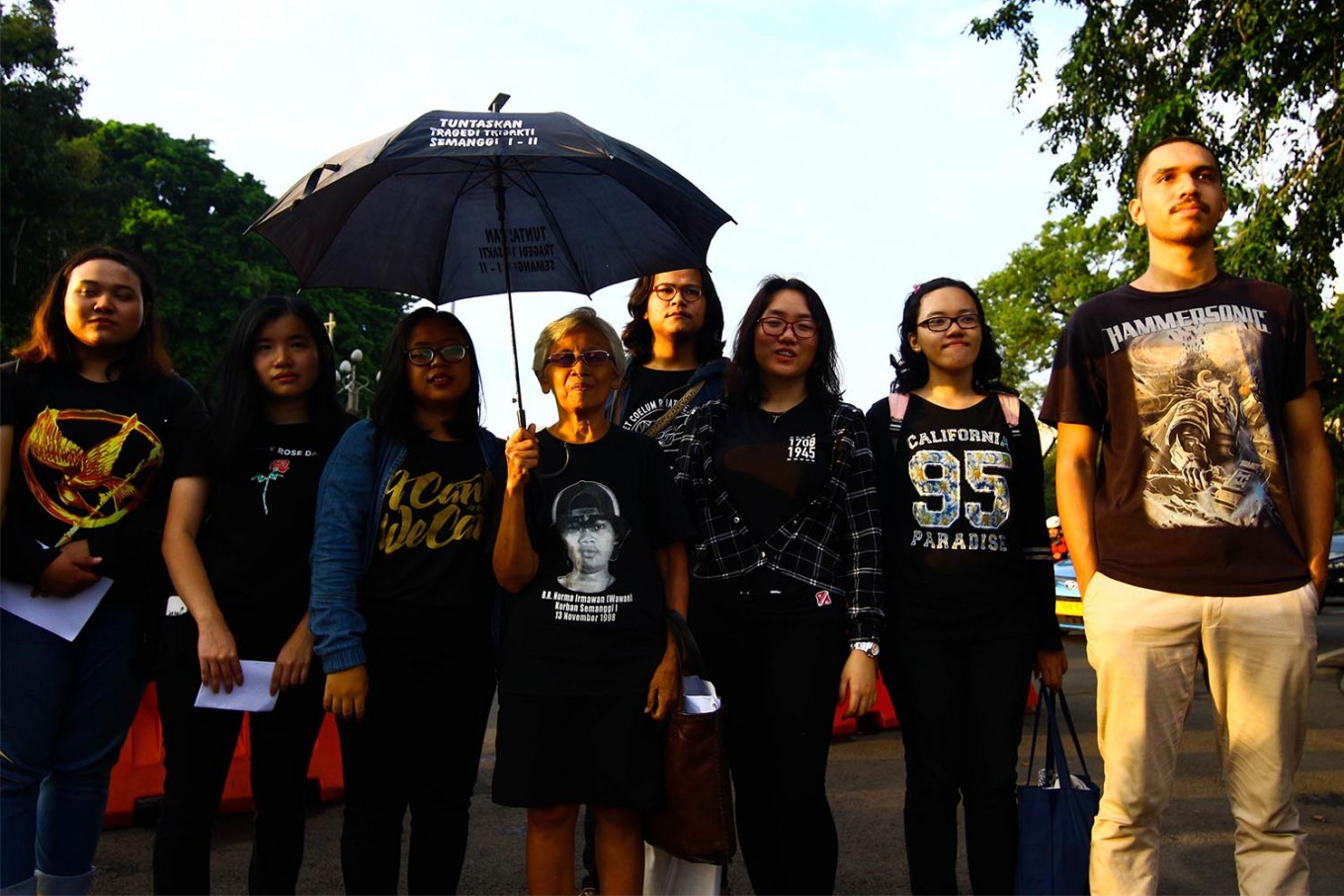Popular Reads
Top Results
Can't find what you're looking for?
View all search resultsPopular Reads
Top Results
Can't find what you're looking for?
View all search resultsJokowi handles human rights better than Soeharto: Minister
Mahfud said today’s human rights violations occurred between societal groups rather than being state sanctioned.
Change text size
Gift Premium Articles
to Anyone
 Maria Catarina Sumarsih (center) holds an umbrella during the 536th weekly silent protest in front of the State Palace in Jakarta on April 26, 2018. The protests, which began in 2007, urged the government to resolve human rights abuse cases, including the 1998 Semanggi shooting, which resulted in the death of Maria’s son, Bernardus Realino Norma Irawan. (JP/Aditya Bhagas)
Maria Catarina Sumarsih (center) holds an umbrella during the 536th weekly silent protest in front of the State Palace in Jakarta on April 26, 2018. The protests, which began in 2007, urged the government to resolve human rights abuse cases, including the 1998 Semanggi shooting, which resulted in the death of Maria’s son, Bernardus Realino Norma Irawan. (JP/Aditya Bhagas)
C
oordinating Political, Legal and Security Affairs Minister Mahfud MD has acknowledged that human rights violations are still prevalent in Indonesia but has said there is almost no systematic state violence in the current administration.
“We are improving, so don’t look back to the past as if it’s the same political violence. Democracy has been put in place and has been distributed to all institutions. Before the Reform era, human rights shortcomings and structural violence were hegemonic, leaving 12 problems of human rights violence from the past,” Mahfud said in a speech on Human Rights Day, Dec. 10, at the Merdeka Building in Bandung on Tuesday.
Mahfud said today’s human rights violations occurred between societal groups rather than being state sanctioned.
“Are there still human rights violations? Of course there are. Now human rights violations are horizontal, done by one group of people to another group of people. In fact, the government has become the victim, being bullied by society in civil conflicts,” Mahfud said.
He compared the current situation to patterns of human rights violations under the New Order, which included extra-legal, state-sponsored kidnapping and detention of citizens.
“There is no such thing now. Today, state officials are stoned, admitted to the hospital, beaten. Therefore, to examine the human rights violations in this country, we have to change the pattern,” Mahfud said.
Further, Mahfud said that people's rights under President Joko “Jokowi” Widodo’s administration were not only legal and civil but also economic, social and cultural.
“People should see human rights protection clearly. [The government] does not only protect civil and political rights. It protects economic rights through poverty eradication, the social safety net, education cards and many other programs. Everything is done through programs of poverty eradication, education distribution and affirmative action,” he said.
He mentioned the Saudara Papua program, which helps Papuan students enroll in partnering universities.
Mahfud said the resolution of past human rights violations was slow due to the development of democracy in Indonesia.
“Many have said we are sluggish in settling the human rights violations of the past [...] The government has a mechanism to remedy them. We have to realize that although it is slow, we are more democratic,” he said.
“It is sluggish because power is distributed […] If the government took an authoritative step, the decision would be easier, but it would violate the reformation mandate,” he said.
Mahfud said the 1965 human rights abuse case would be easier to settle in the current administration because of the Truth and Reconciliation Commission (KKR). (gis)









